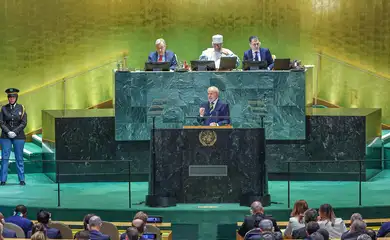Lula: “Liberal democracy has thwarted the expectations of millions”

Hours after speaking at the opening of the debate of heads of state at the 79th United Nations (UN) General Assembly in New York, Brazilian President Luiz Inácio Lula da Silva took part on Tuesday (Sep. 24) in a side event organized by him and Spanish President Pedro Sánchez, a meeting entitled “In Defense of Democracy: Fighting Extremism,” also at the UN headquarters in the US city.

At the event, the Latin American leader discussed the reduced confidence in the democratic regime, which has been shaken by the worsening of capitalist exploitation, making room for extremism and totalitarian forces.
“Liberal democracy has proved insufficient and has frustrated the expectations of millions. It has become nothing more than a ritual we repeat every four or five years. A model that works for big business and abandons workers to their fate is not democratic. A system that privileges white men and fails black women is immoral. Plenty for the few and hunger for the many in the 21st century is the gateway to totalitarianism. Our fight is to ensure that democracy is once again perceived as the most effective way of winning and enforcing rights,” he declared, adding that democracy is going through its most critical moment since World War II.
The meeting was accompanied by the presidents of France, Emmanuel Macron; Cape Verde, José Maria Neves; Chile, Gabriel Boric; and the European Council, Charles Michel. Also present were the prime ministers of Canada, Justin Trudeau; East Timor, Xanana Gusmão; Barbados, Mia Motley; as well as representatives from Norway, Colombia, Kenya, Mexico, the US, Senegal, and the UN.
Transparency
Co-host of the meeting, President Pedro Sánchez discussed the destabilization caused by digital networks and talked about a plan to promote democracy. “We need to promote transparency and accountability in the media and digital platforms, especially in those who develop artificial intelligence. In Spain, we have just approved an action plan for democracy in which we address these as well as other issues, implementing concrete measures to improve the quality of information, strengthening transparency. Citizens need to know who owns the media behind the information they publish and consume,” he stated.
Despite criticizing capitalism, President Lula noted he does not advocate “doing away with the free market, but rather recovering the role of the state as a planner of sustainable development and as a guardian of well-being and equity.”
The Brazilian leader went on to describe freedom of expression as central to an absolute democracy, adding, however that this freedom should not be absolute, and advocated regulating social networks to curb the spread of discourse that leads to oppression.
“Digital technologies help to promote and spread knowledge, but they also increase the risks to civilized coexistence between people. Digital networks have become a breeding ground for misogynistic, racist, and xenophobic hate speech that claims victims every day. Our societies will be under constant threat as long as we are not firm in regulating platforms and the use of artificial intelligence,” he argued.
“I pray we don’t have to go through another world war to be able to do the right thing. We are aboard this bloc because the democratic system, despite its imperfections—the inequality, the excessive dependence on the market—is the best model,” said Barbados Prime Minister Mia Mottley.
Fighting extremism
Both Lula and Sánchez pointed out that Tuesday’s meeting marks the beginning of a series of other activities between these nations to defend democracy and combat extremism.
“Extremist movements promote hate speech, polarization, division, intolerance, radicalization, and violence, weakening civic dialogue and threatening social cohesion. Extremists always seek to undermine citizens’ trust in the institutions that guarantee freedoms and the rule of law,” said Cape Verdean President José Maria das Neves.
Chilean President Gabriel Boric said progressive leaders who defend democracy should not waver in their condemnation of authoritarianism, regardless of their ideology. He cited the cases of Venezuela, Israel, Nicaragua, and Russia.
“Faced with these situations, we need to adopt a single position as progressive countries. We, as progressive movements, need to be able to defend principles. And in this I think we sometimes fail, because we don’t use the same measure to judge those who are on our side.”





